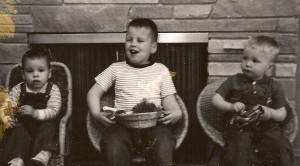Learning the Lexicon of “Private Language”
 Every group has it’s own way of talking. They’ve got things they say that make sense to them. Every culture has its own way of communicating among themselves. Even a culture of small boys.
Every group has it’s own way of talking. They’ve got things they say that make sense to them. Every culture has its own way of communicating among themselves. Even a culture of small boys.
We’ll get to the boys in a minute.
I’ve made a career out of being in new situations. I’m often working in contexts I haven’t been in before: new subjects, industries, cultures and communities. Somehow I have to learn how to communicate and be productive in them. I call this Learning the Lexicon.
As a mediator, I’m an outsider all the time. I come into groups and am expected to understand them and have a positive, constructive effect on their interaction.
Learning the Lexicon often feels like learning how to talk all over again. I’ve got to learn language and ways of speaking that are new to me. In a mediation I need to become functional, if not fluent, in new ways of communicating. And I have to do this all very quickly.
Now for the story about the boys.
As a small boy I had a hearing impairment that affected the way I heard and learned to speak some words. The “baby words” I learned first, before the impairment, were clearly spoken. Words I learned later were not. They sounded muffled to me, so that’s how I pronounced them.
My cousin lived nearby. He was only six months older and we played together constantly. He understood what I was saying. He could even speak that way himself to me. But it was gibberish to everyone else. My parents called it our own “private language.”
When I’m first working with a new group – just like my private language with my cousin was to my parents – what they are saying can all sound at first like so much gobbledygook to me.
Sometimes the lexicon has words that are familiar and that I think I know. But they can be used in new ways. In one organization they used the verb to stoke constantly. It wasn’t just colloquial: “man, I was stoked!” I learned it had a very specific meaning in this non-profit regarding motivation of their community of volunteers.
And of course, the most familiar words are clichés. Clichés have lots of meaning – that’s why they’re over-used and become clichés. They were clever once, but now, maybe not so much. (Though they sometimes can be used cleverly again: my wife, on cleaning-up after the cat, described how he was “thinking outside the box.”)
Clichés are ambiguous, which is to say that they have so much meaning and so many meanings that the specific meaning intended by the speaker may not be clear to the listener, and even less clear if the listener is an outsider. Yet in the context of a community, even clichés can have very specific meanings that are very well understood by the group as part of their “private language.”
A group’s lexicon usually also has jargon. These are new phrases or sometimes new words that have very specific meanings to a group. Yet to an outsider they can be vague and meaningless.
Jargon is common among people in government agencies. And boy, do they love their acronyms. When working in government groups much of my learning is just figuring out their TLA’s (Three-Letter Acronyms). Knowing the words behind the acronyms may only be a start.
Understanding that context in that group for the language they use is just as important as the words themselves.
Here’s an example. A phrase often used in some groups is “capacity-building.” It can be used with no more context than that – “we need to work on capacity-building.” When I hear that, it begs a host of questions: “Capacity of what? What capacity are you building? Why are you building it? What are you building the capacity for?”
The context may be completely unspoken in the casual conversation among those inside the group. They understand the context so they understand the phrase and what it means.
Whether the words use are cliché or jargon or something else, a big part of a group’s private language is the unspoken context in which those words are spoken. Learning the Lexicon involves all of this.
(Yes, technically, what I’m taking about is more than just lexicon – I should have called it something else. But then it wouldn’t have that nice L-based alliteration. So I’m sticking to it.)
As a mediator I don’t Learn the Lexicon just to be able to communicate with the people in groups. That’s necessary of course. But it’s just a start. There’s a deeper purpose for it. That’s the next post: Learning the Lexicon: “That’s Good Medicine.”


